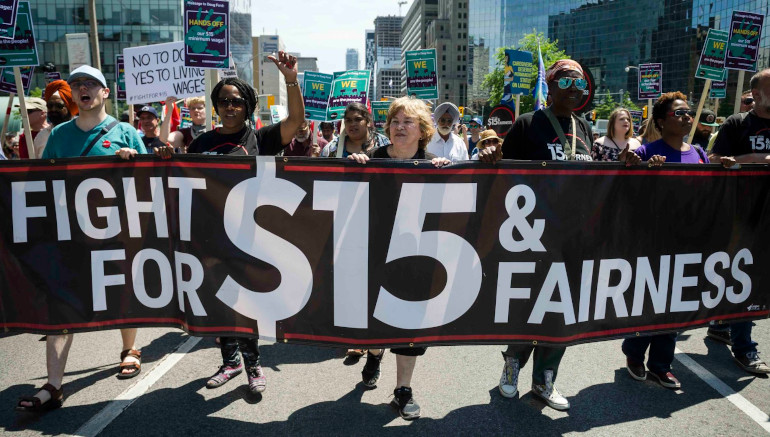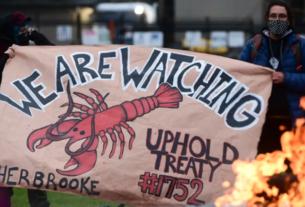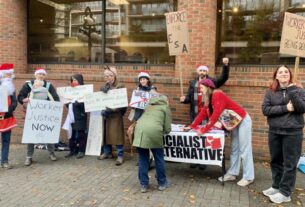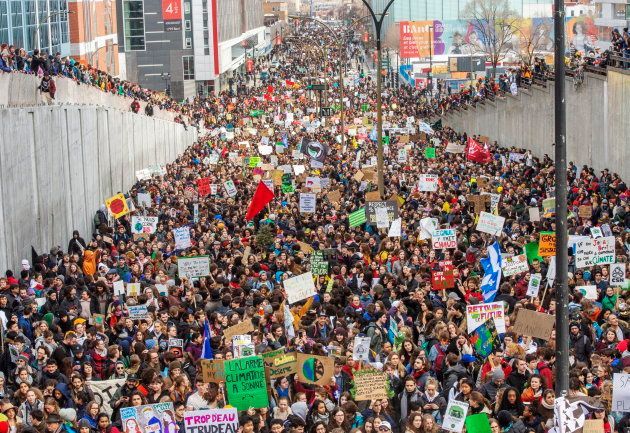Socialist Alternative Canada reviews the winning of $15, and its role in this victory
On June 1, workers in British Columbia got the first increase on the way to a $15.20 an hour minimum wage. BC is following Alberta and Ontario in moving to a minimum wage of $15 or more. Alberta will reach $15 by the end of 2018. Ontario’s rate has already gone to $14 and is scheduled to reach $15 by early 2019.
Three provinces, with 63% of Canada’s population, are heading to $15. This is a major win for millions of low paid workers. Quite a change from the start of 2014 when the idea of $15 exploded across the US and Canada after Seattle’s win, led by Socialist Alternative’s Kshama Sawant. In 2014 the minimum wage in Ontario and BC was $10.25 while Alberta’s was $9.95.
This victory is due to the hard work of thousands of activists and the support of hundreds of thousands of people across Canada.
The Road to $15
The movement for $15 captured public attention when, in November 2012, over 100 fast-food workers walked off their jobs in New York City. In Seattle’s 2013 council elections, Socialist Alternative’s Kshama Sawant made a $15 minimum wage a central part of her campaign. Initially most other candidates were not enthusiastic supporters. After Sawant was elected, she along with unions, community groups and Socialist Alternative launched a campaign for a $15 minimum wage. By May of 2014 Seattle had agreed to move to a $15 minimum wage. This victory generated excitement far beyond the city and boosted the fight to raise the minimum wage across the US.
Seattle’s victory of $15 spread into Canada, adding energy to the existing campaigns including that for $14 in Ontario and $13 in BC. The call for $15 became a unifying demand across the country.
In the summer of 2014 Socialist Alternative in Canada started discussing a campaign for $15 here. During this time we were approached by members of the BC Federation of Labour’s (BC Fed) young workers’ committee. They had been inspired by Seattle and wanted to push the BC Fed to launch a campaign for $15 in BC (up until then the BC Fed had been calling for a $13 minimum wage). We worked with these young workers and others and at the BC Fed’s conference in November 2014 the “Fight for 15” was launched.
At the Canadian Social Forum in August 2014 one of the workshops Socialist Alternative hosted was on the Fight for $15 with a speaker from the US. There was significant interest from delegates from Ontario and Québec about the struggle in Seattle and the idea of uniting around $15 across Canada.
In Ontario there was a lively campaign fighting for $14, and this changed to $15 in 2015. In Québec there was no strong minimum wage campaign. Our comrades in Alternative Socialiste launched “15 plus” in the autumn of 2015. By 2016, the demand for $15 was prominent on May Day and two campaigns were launched by the FTQ and CSN union federations.
In Alberta, the New Democratic Party (NDP, a party with social democratic roots) promised a $15 minimum wage in the May 2015 provincial election. They won the election and Alberta became the first jurisdiction in Canada to legislate for a $15 minimum wage.
Alberta
After 44 years in power, the Alberta Conservatives were deeply unpopular. Although there was no strong campaign in Alberta for a $15 minimum wage, the NDP, not expecting to win the May 2015 provincial election, promised a $15 minimum wage. The NDP won and stuck to the $15 commitment. Alberta will be the first province or territory to reach $15, by October 2018. The pledge of $15 in Alberta boosted the struggle in other parts of Canada with the view that if Alberta can do it so can we.
Ontario
There had been a campaign in Ontario for a $14 minimum wage for several years that switched to $15 in 2015. The campaign also had demands on working conditions and union rights which is the fairness part of “15 and Fairness.”
The bedrock of the campaign was the Workers’ Action Centre (WAC) in Toronto, a long-time organizing group and help centre which has campaigned to raise the minimum wage as well as to improve basic labour standards. The WAC provided an established network of activists, independent of the Ontario Federation of Labour, to campaign on 15 and Fairness. This and the establishment of 15 and Fairness groups in cities beyond Toronto and on campuses provided Ontario with more consistent on-the-ground activity than in BC. 15 and Fairness did not always get support from the Ontario NDP or the Federation of Labour, in contrast to BC’s Federation of Labour.
The work of 15 and Fairness included tabling, petitioning, demonstrations, lobbying of MPP offices and intervening in the hearings over legislation. Several groups of workers, at universities and the Toronto airport, took industrial action to fight for 15 and Fairness.
One outstanding feature of the campaign was the regular organizing meetings of 60 or more activists held every other Tuesday to hear reports of the work in Toronto and to plan ahead. In addition, monthly teleconferences were held to link Toronto to the more far flung parts of the province. Three all-Ontario weekend conventions brought activists together, including to hear about the struggle in the US.
After Ontario increased the minimum wage to $14, in January 2018, a group of Tim Hortons franchisees cut workers’ benefits and break times. This provoked widespread protests across Canada. In Ontario there were 38 protests, including 18 in Toronto.
Socialist Alternative members in Toronto have been consistently involved in the $15 campaign, supporting the airport workers, attending meetings and rallies, doing canvassing and phoning, setting up a Tim Hortons’ protest and organizing an action inside a Toronto restaurant whose owner had gone very public in his opposition to the increase in minimum wage.
British Columbia
From the start of the Fight for 15, Socialist Alternative members were active in the campaign. Some of our members had concerns that the BC Fed might be too cautious and restrictive. However, as this was not the case, we agreed that it was better to work with the BC Fed with its resources and connections to the union movement.
The BC Fed set up a working group that met regularly to oversee the $15 campaign and Socialist Alternative members were involved from the start. We were open about our membership in Socialist Alternative at all of these meetings and activities, and our work was respected by other Fight for 15 members and the BC Fed.
The main activity the BC Fed organized was a monthly event, usually leafleting, which aimed to gain media coverage – which it did successfully. There were rallies, lobbies of politicians and protests in many cities in BC. The BC Fed co-organized with many community groups a week of action for a Poverty Free BC.
Based on the experience of Seattle, and other community-based campaigns that the CWI has been involved in, Socialist Alternative members put forward a strategy of building local campaign groups.
There was a short-lived attempt by others to set up a group in part of East Vancouver. We attended the early meetings hoping to help it succeed. However, after a few months the main organizers lost interest and stopped doing $15 work.
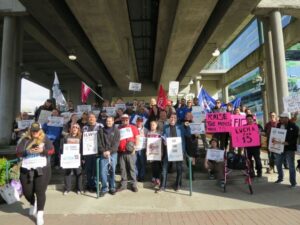
The focus of Socialist Alternative’s work was in Surrey. As Vancouver has become more unaffordable, Surrey has grown rapidly with a large working class, but is often neglected by campaigns. For over two years there was regular tabling, several working group meetings with attendance of up to 25 people, a barbeque and several rallies and marches. A core of regular activists was established with involvement from several local unions including CUPE and ILWU. The Surrey Working Group gained media coverage independent of the BC Fed’s central work.
Socialist Alternative suggested, successfully, that the BC Fed deliver the petition with 56,000 signatures to the BC legislature. As part of the Canada-wide day of action against Tim Hortons, Socialist Alternative proposed two solidarity activities, early morning in Surrey and evening on Commercial Drive. These were the two events that the BC Fed also supported, and were co-organized by the BC Fed and Socialist Alternative.
Québec
Alternative Socialiste launched the first campaign in Québec for $15, “15 plus” in the autumn of 2015. The struggle in Québec had a very immediate and real focus. On May 27, 2016, 200 unionized workers at the Old Port of Montreal went on strike demanding a starting wage of $15 an hour, compared to the existing $10.67 an hour. While they were members of a local of the Public Service Alliance of Canada (PSAC), the union support was lacklustre. In contrast, our small sister organization, Alternative Socialiste, gave them solid support. It was Socialist Alternative Canada and the Committee for a Workers International (the international organization that Socialist Alternative is affiliated to) that spread news of the dispute outside of Québec. Unfortunately the strike did not win $15.
At the World Social Forum in Montreal in August 2016 there were three well attended workshops on $15, one of them hosted by Socialist Alternative. There was also a solidarity rally for the Old Port Workers which Alternative Socialiste helped to organize.
Alternative Socialiste also worked with Québec solidaire to raise the petition for 15 in Québec’s National Assembly.
Timetable to $15 in Canada
| 2012, Nov | 100 fast-food workers strike in New York City |
| 2013, Nov | Socialist Alternative’s Kshama Sawant elected to Seattle Council |
| 2014, May | Seattle Council agrees to move to a $15 minimum wage |
| 2014, August | Socialist Alternative hosts a workshop on Fight for $15 at Canadian Social Forum |
| 2014, Nov | BC Federation of Labour agrees $15 rather than $13 minimum wage campaign |
| 2015, March | Ontario campaign moves to $15 rather than $14 minimum wage |
| 2015, April | Alberta NDP election manifesto includes $15 minimum wage |
| 2015, May | Alberta NDP wins election |
| 2015, Sept | Alternative Socialiste launches “15 plus” in Québec |
| 2016, April | Québec’s Union Federations, FTQ & CSN, and Québec solidaire launch $15 campaigns |
| 2016, May | Old Port workers in Montreal on strike for $15 |
| 2016, Sept | Alberta enacts legislation for $15, to be reached by the end of 2018 |
| 2017, April | BC NDP election manifesto includes $15 minimum wage |
| 2017, May | Ontario Liberals announce move to $15 by end of 2019 |
| 2017, August | BC NDP forms government with commitment to $15 |
| 2018, Jan | Ontario has $14 minimum wage |
| 2018, Feb | BC announces move to $15.20 by 2021 |
| 2018, June | BC has first increase, to $12.65, on path to $15 |
| 2018, Oct | Alberta will reach $15 |
Comparing Results Between Provinces
The outcome of a campaign is decided not only by the determination of those involved or the skill of the tactics, although both of these are important. The outcome also depends on the political circumstances in which the campaign is waged. This is clearly the case with the campaigns for a $15 minimum wage.
Alberta will be the first province to reach $15. However, this was not primarily due to on-the-ground campaigning. The win was a combination of unusual factors – the victory in Seattle, a radical NDP election manifesto and a surprise election victory for the NDP. As the NDP did not expect to win the 2015 election, they put forward, by NDP standards, a radical manifesto, including a $15 minimum wage. It is odd how when the NDP don’t expect to win they put forward radical policies and sometimes win and when they expect to win they put forward a moderate manifesto and often lose. After the 2015 victory they delivered on the $15 commitment. Winning $15 in Alberta boosted the movement in other provinces.
In Ontario, after years of only modest increases in the minimum wage, the Liberals’ change of heart was a cynical electoral manoeuvre. Facing disaster in the 2018 elections, they tried unsuccessfully to boost their support and squeeze the NDP by announcing a rapid move to $15 in the spring of 2017. Obviously the work of 15 and Fairness had built the public support that the Liberals attempted to exploit. However, the last step from $14 to $15 is under threat if Ontario’s Conservatives, with Doug Ford as leader, wins the election on June 7.
In BC the Fed’s strategy was based on getting the NDP to commit to $15 and then win the election. Eventually, after a roundabout journey, this is what happened, with the NDP government announcing the move to $15 by 2021, in-line with their election commitment. The phased increases began with $1.30 this June, then $1.20 in 2019 with smaller increases in the next two years to reach $15.20 in 2021.
Québec has the most militant unions in Canada and saw a high profile strike for $15 but the minimum wage only reached $12 this May, with no plan to go to $15. At present neither the PQ nor the Liberals see a political advantage in moving to $15.
There have been more modest campaigns in other Canadian provinces and territories, although so far they have not succeeded in winning a big increase in the minimum wage. However, with Alberta reaching $15 this year, Ontario currently at $14 (and hopefully reaching $15 in 2019) and BC moving to $15, these will have an impact on other provinces. For example, the minimum wage in Ottawa is $14 while across the river in Gatineau it is only $12.
Minimum Wage Rates in rest of Canada
| Province and Territory | $ per hour | When Increased |
| NWT | 13.46 | From April 2018 |
| Nunavut | 13.00 | |
| PEI | 11.55 | From April 2018 |
| Yukon | 11.32 | Annual increase linked to inflation |
| New Brunswick | 11.25 | From April 2018 |
| Manitoba | 11.15 | Annual increase linked to inflation |
| Newfoundland and Labrador | 11.00 | |
| Saskatchewan | 10.96 | Annual increase linked to inflation |
| Nova Scotia | 10.85 | Annual increase linked to inflation |
Socialist Alternative in the Campaign
Socialist Alternative has consistently been part of the fight for $15 across Canada. Other left groups have not been so consistent.
The experience of our involvement in the $15 campaigns has been invaluable for our relatively new organization. It has taught us how to do street work and agitationally engage with the public. We have won respect and built links in the wider movement. The campaign gave Socialist Alternative a higher profile than if we had not been involved, an important achievement for a relatively new force on Canada’s left.
The work and success of $15 is an example of applying perspectives, picking an area of work to prioritize and sticking to it. This way a small organization can have an impact.
Socialist Alternative in Canada and the US is proud of the work we have done, with modest forces, to make a real difference in the living standards of millions of low paid workers, especially women who are the majority of low paid workers. The widespread support for $15 indicates the growing resistance to the massive inequality and poverty in society. At this stage it is largely a mood and not a movement, but that will come.

